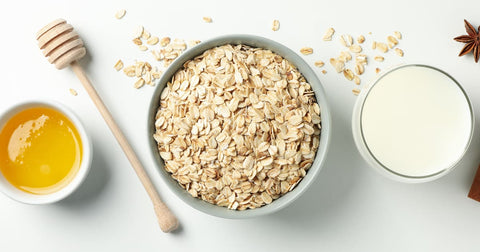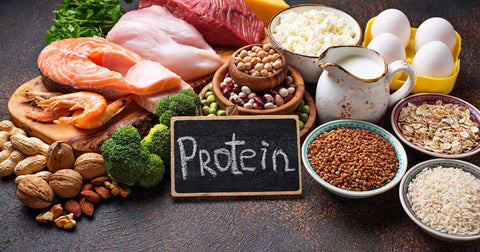Diet plays a crucial role in achieving and maintaining weight loss. Among the many dietary options, oatmeal stands out as a popular breakfast choice touted for its health benefits. But is oatmeal really good for weight loss? This article delves into the nutritional profile of oatmeal, explores its benefits and potential drawbacks, and offers practical tips for incorporating it into a weight-loss diet.

Nutritional Profile of Oatmeal
Oatmeal is derived from oat grains, which are packed with essential nutrients that make it a healthy dietary choice. A typical serving of oatmeal provides a substantial amount of dietary fiber, primarily soluble fiber known as beta-glucan. This fiber type is celebrated for its ability to lower cholesterol levels and improve heart health. Additionally, oatmeal contains a significant amount of protein, which is essential for muscle repair and growth.
Oatmeal is also rich in vitamins and minerals. It provides a good dose of manganese, phosphorus, magnesium, iron, zinc, and folate. The B vitamins found in oats, such as B1 (thiamine) and B5 (pantothenic acid), play a critical role in energy metabolism. Moreover, oatmeal is low in fat and contains no cholesterol, making it an excellent choice for those looking to maintain a heart-healthy diet. The combination of these nutrients makes oatmeal a nutrient-dense food that can support overall health while aiding weight loss efforts.
Benefits of Oatmeal for Weight Loss
One of the primary reasons oatmeal is considered beneficial for weight loss is its high fiber content. The soluble fiber in oatmeal, beta-glucan, forms a gel-like substance in the gut, which helps to slow down digestion. This results in a prolonged feeling of fullness and reduced hunger, ultimately leading to a decrease in overall calorie intake. Studies have shown that diets high in fiber are associated with lower body weight and a reduced risk of obesity.
Fiber Content and Satiety

Oatmeal’s high fiber content is a crucial factor in its effectiveness for weight loss. Soluble fiber, particularly beta-glucan, is known for its ability to absorb water and expand in the stomach. This gel-like substance not only slows digestion but also increases the volume of food in the stomach, enhancing feelings of satiety and fullness. When you feel full for longer periods, you are less likely to snack between meals or overeat, which directly contributes to a lower overall calorie intake.
Furthermore, fiber-rich foods like oatmeal can help regulate bowel movements and prevent constipation, which is an added benefit for overall digestive health. Regular consumption of fiber also aids in maintaining a healthy gut microbiome, which has been linked to better weight management and reduced inflammation.
Low Glycemic Index and Blood Sugar Control
Another significant benefit of oatmeal is its low glycemic index (GI). Foods with a low GI are digested and absorbed more slowly, leading to a gradual rise in blood sugar and insulin levels. This slow release of energy helps to control hunger and prevent the spikes and crashes in blood sugar that can lead to overeating. By maintaining stable blood sugar levels, oatmeal helps to manage cravings and reduce the likelihood of consuming excess calories.
A stable blood sugar level is essential for weight management. When blood sugar levels spike rapidly, the body releases insulin to help cells absorb the glucose. If this happens frequently, it can lead to insulin resistance, which is a risk factor for obesity and type 2 diabetes. By choosing low GI foods like oatmeal, you can help maintain insulin sensitivity and reduce the risk of developing these metabolic disorders.
Nutrient Density and Overall Health

Oatmeal is also nutrient-dense, meaning it provides a high amount of vitamins, minerals, and other essential nutrients relative to its calorie content. This makes it an excellent food choice for those looking to lose weight while ensuring they get adequate nutrition. Consuming nutrient-dense foods like oatmeal can help prevent nutrient deficiencies that are often associated with restrictive diets.
Oatmeal is rich in several essential nutrients, including manganese, phosphorus, magnesium, copper, iron, zinc, folate, and B vitamins. These nutrients play various roles in maintaining overall health and supporting bodily functions. For instance, B vitamins are crucial for energy metabolism, while magnesium and potassium are vital for muscle function and cardiovascular health.
Additionally, oatmeal contains antioxidants, such as avenanthramides, which have anti-inflammatory properties and can help lower blood pressure. These health benefits contribute to overall well-being and can enhance your weight loss efforts by supporting a healthy, functioning body.
Enhanced Satiety and Metabolic Health
The combination of high fiber, low GI, and nutrient density makes oatmeal an effective food for enhancing satiety and promoting metabolic health. Enhanced satiety leads to reduced overall calorie intake, while stable blood sugar levels and adequate nutrient intake support efficient metabolic processes. When your metabolism functions optimally, your body can better convert food into energy, store nutrients appropriately, and burn fat.
Moreover, oatmeal can be customized to suit individual dietary needs and preferences. By adding protein-rich toppings such as nuts, seeds, or Greek yogurt, you can further increase the satiety and nutritional value of your meal. Including healthy fats, like those found in nuts and seeds, can also help keep you full and satisfied longer.
Potential Drawbacks
Despite its numerous benefits, oatmeal is not without its potential drawbacks. One concern is its caloric content. While oatmeal is low in calories compared to many other breakfast options, it is still possible to overconsume it, especially when adding high-calorie toppings like sugar, cream, or dried fruit. Portion control is crucial to ensure that the calorie intake remains conducive to weight loss.
Another consideration is individual dietary needs. While oatmeal is suitable for many people, those with certain medical conditions or dietary restrictions may need to limit or avoid it. For example, people with gluten intolerance or celiac disease should choose gluten-free oats to prevent adverse reactions. Additionally, some people may find that oatmeal does not satisfy their hunger as effectively as other protein-rich breakfast options, leading them to consume more calories later in the day.
Practical Tips for Incorporating Oatmeal into a Weight Loss Diet

To maximize the weight loss benefits of oatmeal, it is essential to prepare it in a healthy way. Avoid adding large amounts of sugar, syrup, or other high-calorie sweeteners. Instead, opt for natural sweeteners like fresh fruit or a small amount of honey. Adding protein-rich toppings such as nuts, seeds, or Greek yogurt can also help increase satiety and balance the meal.
Portion control is another important aspect. A standard serving size of oatmeal is typically around 1/2 cup of dry oats, which yields about 1 cup of cooked oatmeal. Sticking to this serving size can help prevent overconsumption and keep calorie intake in check.
Oatmeal can also be incorporated into various meals throughout the day. For breakfast, consider adding cinnamon, berries, and a splash of almond milk to your oatmeal. As a snack, oatmeal can be used to make energy balls or baked into healthy oatmeal cookies. For a savory twist, try making a vegetable and herb oatmeal risotto for lunch or dinner.
Comparison with Other Breakfast Options
When compared to other popular breakfast choices, oatmeal often comes out on top in terms of its health benefits. Many breakfast cereals, for instance, are highly processed and contain added sugars, which can lead to spikes in blood sugar and increased hunger later in the day. Toast and pastries, while convenient, are often high in refined carbohydrates and fats, contributing to weight gain rather than loss.
Smoothies can be a healthy option if made with the right ingredients, but they can also be high in calories and sugar if not carefully balanced. In contrast, oatmeal offers a low-calorie, nutrient-dense alternative that can be customized to fit various dietary needs and preferences. Its combination of fiber, protein, and complex carbohydrates provides a balanced meal that supports weight loss and overall health.
Frequently Asked Questions
Can eating oatmeal every day help with weight loss?

Yes, eating oatmeal daily can aid weight loss due to its high fiber content, which promotes feelings of fullness and reduces overall calorie intake. Additionally, oatmeal has a low glycemic index, helping to stabilize blood sugar levels and control hunger. However, it's essential to monitor portion sizes and avoid adding high-calorie toppings to maximize its benefits.
What is the best way to prepare oatmeal for weight loss?
To prepare oatmeal for weight loss, cook it with water or a low-calorie milk alternative like almond or skim milk. Avoid adding sugar or high-calorie sweeteners. Instead, enhance the flavor with fresh fruits, spices like cinnamon, or a small amount of honey. Adding protein-rich toppings such as nuts, seeds, or Greek yogurt can also help increase satiety and balance the meal.
Is instant oatmeal as effective for weight loss as traditional rolled oats?
While instant oatmeal can be convenient, it is often more processed and may contain added sugars and preservatives, which can reduce its effectiveness for weight loss. Traditional rolled oats or steel-cut oats are less processed and retain more of their natural nutrients and fiber, making them a better choice for weight loss. If you choose instant oatmeal, opt for plain, unsweetened varieties and add your healthy toppings.
How does oatmeal compare to other breakfast options for weight loss?

Oatmeal is generally a better breakfast option for weight loss compared to many cereals, pastries, and refined carbohydrate-rich foods. Its high fiber content and low glycemic index help control hunger and stabilize blood sugar levels. Unlike many processed breakfast options, oatmeal provides a nutrient-dense, low-calorie meal that can be easily customized to suit various dietary needs.
Can oatmeal be part of a gluten-free diet for weight loss?
Yes, oatmeal can be part of a gluten-free diet for weight loss, but it is crucial to choose certified gluten-free oats. Regular oats can be contaminated with gluten during processing. Gluten-free oats are processed in facilities that prevent cross-contamination, making them safe for people with celiac disease or gluten sensitivity.
Conclusion
Oatmeal is a highly beneficial food for those looking to lose weight. Its high fiber content, low glycemic index, and nutrient density make it an excellent choice for a satisfying and healthy breakfast.
While portion control and mindful preparation are essential to avoid potential drawbacks, the versatility and health benefits of oatmeal make it a valuable addition to any weight loss diet. For personalized advice on incorporating oatmeal into your diet, consider consulting with a nutritionist or dietitian who can tailor recommendations to your specific needs and goals.


.png?v=1737390083)
.png?v=1737187409)


